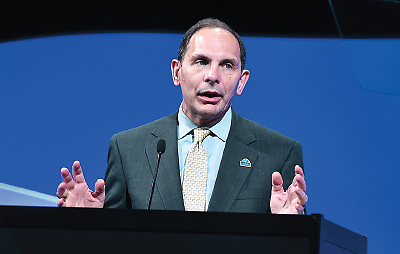“We are the canary in the coal mine” when it comes to mental health, said Veterans Affairs Secretary Robert McDonald in an interview with Psychiatric News and other reporters following an address at the Interim Meeting of the AMA House of Delegates in November.
McDonald delivered a speech outlining efforts to reform the VA in the wake of publicity about substandard care and unusually long waits for appointments in some VA facilities.
But in comments to reporters after the talk, McDonald singled out mental illness as a critical issue for the VA—citing the huge number of veterans in need of treatment for posttraumatic stress disorder (PTSD), traumatic brain injury, and other psychiatric disorders—but also for society in general.
“Mental health care is a problem in this country,” he stated. “It’s not just a problem for those who have suffered PTSD or traumatic brain injury in combat; it is a problem for football players, hockey players, police officers, and many others. We have got to get ahead as a society on mental health.
“As I’ve gone around the country, I’ve discovered we don’t have enough students in medical school studying mental health,” he continued. “Why? Insurance reimbursement rates are low, and there’s a stigma in society about mental health.
“The good news is that at the VA, we know about mental health,” McDonald emphasized. “We are on the cutting edge of mental health. ... It’s a big issue, and as a society, we have to get on top of it.”
During his address, McDonald acknowledged one of the biggest challenges the VA faces is the shortage of clinicians. “The demand for VA care will not decrease any time soon. The nation has been at war for over a decade, and we’ll continue to be caring for many of our severely wounded and ill veterans for decades to come,” he said.
He also singled out psychiatry and the impact that low reimbursement has on access to care, stating that he is willing to use his position to address issues of access to and low reimbursement for quality mental health care.
But the bulk of his talk focused on efforts to fix systemic problems in the VA that resulted in an eruption of bad publicity earlier this year about poor access to care. McDonald described the VA’s “Blueprint for Excellence,” the goals of which are to improve performance of the VA health care system, reset the VA’s culture to place value on job performance, transition from “sick care” to “health care,” and develop efficient, transparent processes to support the VA’s services and programs.
“The problems we face are serious,” McDonald said. “The President, Congress, veterans service organizations, taxpayers, and the VA’s rank and file all understand the need for immediate reforms to achieve the three nonnegotiable goals we set for ourselves more than two months ago—to rebuild trust with veterans and stakeholders, improve service delivery focusing on veteran outcomes, and set a course for long-term excellence and reform. To do this,” he continued, “we’re looking at ways to restructure and reorganize, combine functions, simplify operations, make process improvements, leverage technology, and enhance efficiency and productivity.”
He highlighted federal legislation, including the Veterans Access, Choice, and Accountability Act, which will give authorities funding and other tools to better serve veterans in the short term.
“The Choice Act goes a long way toward enabling the VA to meet the current demand for care and to support the large-scale reforms we’re making for long-term excellence,” McDonald said. “The law provides $5 billion to hire more physicians and other medical staff and $10 billion to fund additional purchased care while building internal capability.
“We recently stepped up the use of purchased care to respond to the shortfalls that came to light last spring. From mid-May through September, the VA authorized non-VA care for over 1 million veterans—46 percent more than in the same period last year.
“We have also begun extending the option of purchased care to eligible veterans who live more than 40 miles from a VA facility, and in the coming months, we’ll do the same for those who have been waiting too long for an appointment. By ‘too long,’ I mean more than 30 days from the clinically appropriate date or the date preferred by the veteran—that’s our new standard.” ■
A video of McDonald’s address can be viewed
here. Information about the Veterans Access, Choice, and Accountability Act can be accessed
here.

